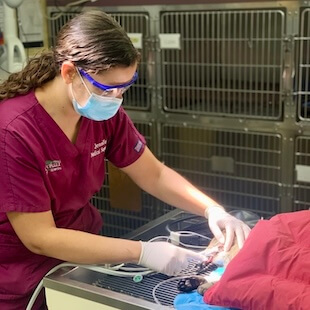
Dentistry
We can assess all the teeth in the mouth, looking at the roots and the bone surrounding the tooth to see if more treatment is needed.
Established in 1970, Green Valley Animal Hospital is a full-service veterinary hospital that has been under the ownership of Dr. Laura Page Warden since October 2003. Our hospital is outfitted with digital radiology, including digital dental radiology, ultrasound, a complete in-house laboratory, surgery suite, ICU, and a variety of essential tools that allow us to quickly diagnose and treat our most critical patients.
The veterinarians of Green Valley Animal Hospital are committed to providing every patient with the highest levels of medical and surgical options available today. The comfort of your pet is our top priority, and we are pleased to say that we offer state-of-the-art pain management to all of our patients. We pride ourselves on our professionalism and quality patient care. Additionally, we are pleased to offer options for boarding and grooming to our clients.
At Green Valley Animal Hospital, the health and safety of our patients, families, staff, and community are our top priorities.
Rabies is a serious but preventable disease, and an important public health concern. In accordance with state regulations and best veterinary practices, we require all pets in our care to be current on their rabies vaccination, unless a valid medical exemption has been issued by the State of Maryland.
We appreciate your cooperation in helping us maintain a safe environment for everyone.
Thank you!
Green Valley Animal Hospital welcomes new clients and patients to our full service veterinary practice in Ijamsville.
We will work with you to decide the best treatment plan for you and your pet, and both of you will become part of our Green Valley Animal Hospital family. Our veterinarians and staff are devoted to staying on top of the latest diagnostics, treatments, and wellness programs to maintain your pet’s optimal health. Let’s work together to keep your beloved furry friend happy and healthy!
We at Green Valley Animal Hospital enrich the lives of all who enter our practice by providing compassionate, lifelong care for your pets, outstanding customer service for our clients and a wonderful work environment for our employees.
